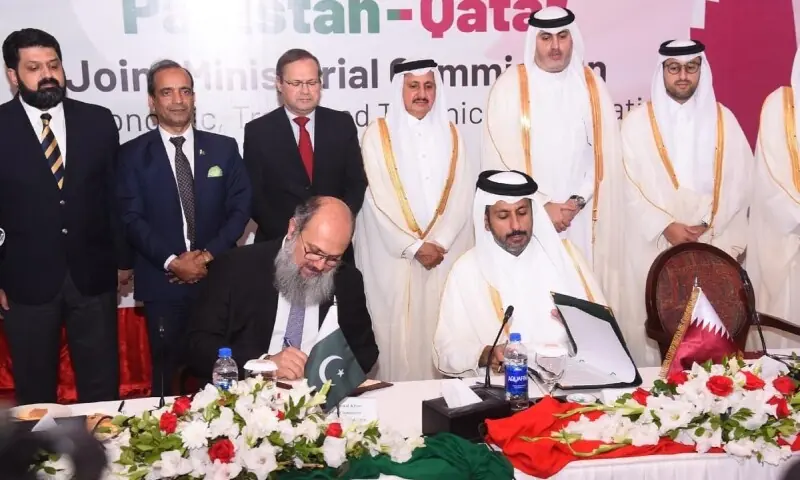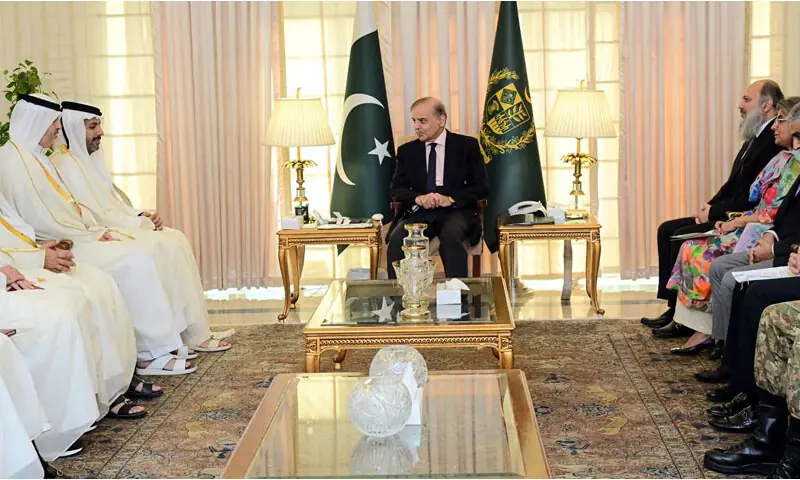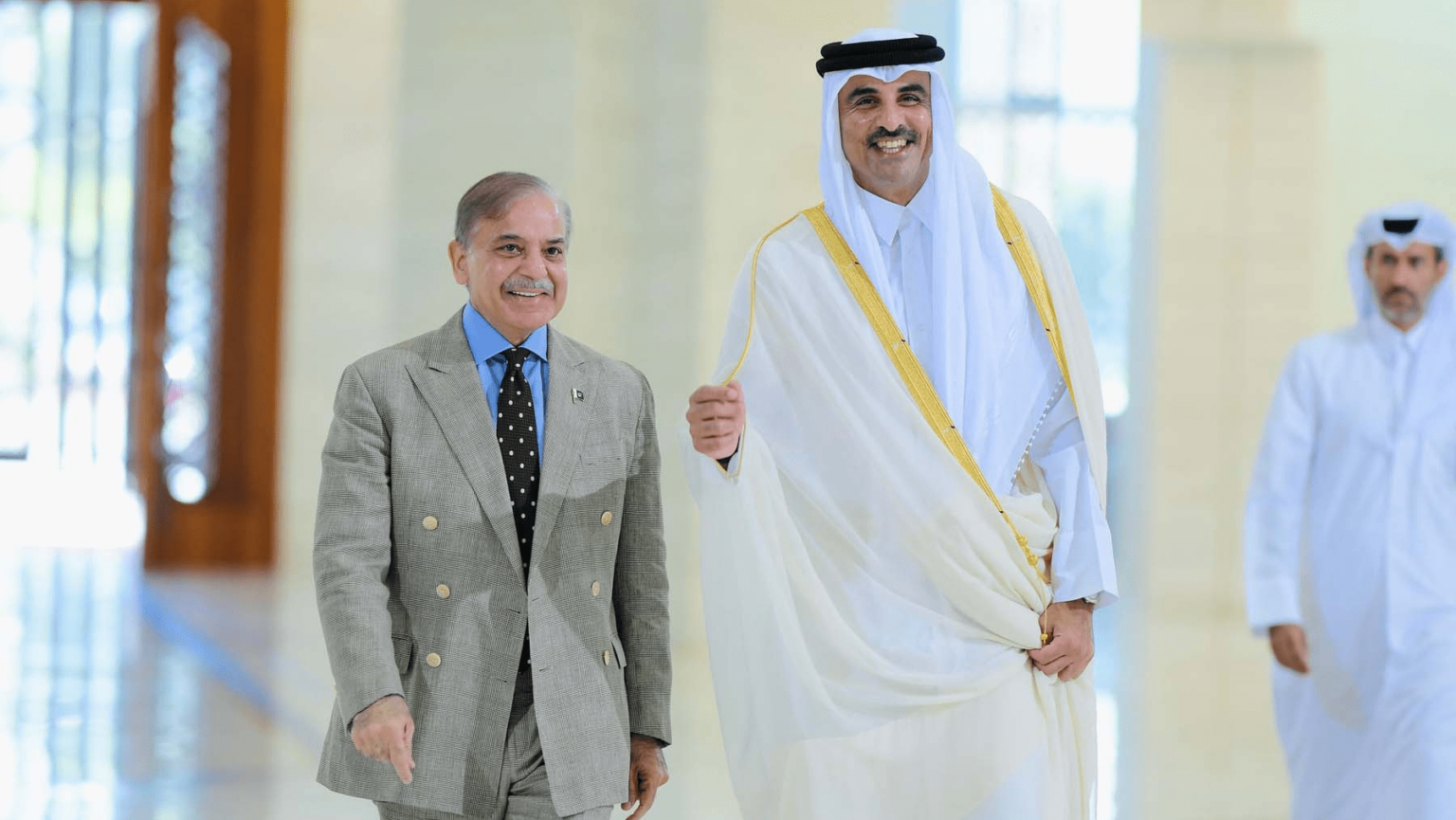Strengthening Bilateral Relations
In a remarkable move towards fostering stronger ties, Pakistan and Qatar have formalized a $3 billion investment agreement, marking a new chapter in their diplomatic and economic relationship. The announcement came during the Sixth Session of the Pakistan-Qatar Joint Ministerial Commission (JMC) on Economic, Trade, and Technical Cooperation, held in Islamabad. The protocol was signed by Pakistan’s Commerce Minister, Jam Kamal Khan, and Qatar’s Minister of Commerce and Industry, Sheikh Faisal bin Thani bin Faisal Al Thani.
This agreement reflects the shared vision of both nations to deepen collaboration, stimulate economic growth, and strengthen long-term partnerships. For Pakistan, this represents a significant opportunity to attract foreign capital and enhance the country’s infrastructure and development projects. For Qatar, it is an avenue to diversify investments and strengthen its strategic presence in South Asia.
A Strategic Investment Framework
At the core of this agreement is the Qatar Investment Authority (QIA), which will channel the $3 billion into various sectors across Pakistan. The investment is not just a financial transaction but a strategic commitment to sustainable development, innovation, and joint growth.
The Special Investment Facilitation Council (SIFC) has been established as part of this initiative. This council serves as the central body for coordinating and facilitating Qatari investments in Pakistan. Its role is to provide a single-window system for investors, simplify regulatory procedures, and ensure a transparent and efficient process. By creating a supportive environment, the SIFC is designed to make investment easier, faster, and more effective, which is expected to boost investor confidence.
Key Sectors of Collaboration
The $3 billion investment is spread across multiple sectors, each carefully chosen to maximize mutual benefit and long-term impact.
- Energy and Infrastructure: Pakistan’s energy sector has long faced challenges, including power shortages and dependency on imported fuels. This investment will focus on renewable energy projects such as solar and wind farms, as well as infrastructure improvements, including roads, bridges, and urban development projects. By modernizing infrastructure, Pakistan can create a more sustainable and efficient economy, while also opening up new opportunities for private enterprises.
- Transport and Technology: Qatar and Pakistan plan to collaborate on modernizing the transportation sector, introducing innovations like electric vehicles, hydrogen-based transport systems, and advanced public transit networks. Investments in technology will also foster digital solutions, including smart cities, IT hubs, and technology parks, which can generate jobs and promote innovation in both countries.
- Health and Education: A portion of the investment will be directed towards improving healthcare facilities and educational institutions. This includes upgrading hospitals, clinics, and medical research centers, as well as developing schools, vocational training centers, and universities. These initiatives aim to build human capital and provide citizens with better access to quality healthcare and education.
- Cultural and Labor Cooperation: Beyond economic collaboration, the partnership emphasizes cultural exchange and labor cooperation. Programs will be implemented to strengthen people-to-people ties, encourage cross-cultural understanding, and promote mutually beneficial employment opportunities. These initiatives are designed to create a sense of shared purpose and understanding between the populations of both nations.

Facilitating Investment through SIFC
The Special Investment Facilitation Council plays a pivotal role in ensuring the smooth execution of projects. By offering a single-window clearance system, the council simplifies administrative and regulatory procedures, reducing delays and bureaucratic hurdles.
This approach is particularly important for attracting Qatari investors, who value clarity, efficiency, and security when exploring foreign markets. The SIFC’s transparent system ensures that investment projects move from planning to execution without unnecessary roadblocks. This proactive support fosters trust between investors and the government, strengthening Pakistan’s reputation as an investment-friendly destination.
Prime Minister’s Invitation to Qatari Investors
Prime Minister Shehbaz Sharif has personally extended an open invitation to Qatari investors to take advantage of the opportunities provided by the SIFC framework. Highlighting sectors such as energy, agriculture, IT, tourism, food security, and infrastructure, the Prime Minister assured that the government is committed to providing the necessary support to ensure the success of these projects.
This invitation is more than symbolic; it reflects Pakistan’s broader vision of encouraging foreign investment while creating sustainable economic growth. It also signals the government’s commitment to building a reliable and predictable business environment, which is crucial for fostering long-term investment and economic stability.
Broader Implications for Regional Cooperation
The $3 billion investment agreement carries significance beyond economics. It represents a strategic move to strengthen Pakistan’s ties with Qatar and, by extension, its position in the Middle East and South Asia. Enhanced bilateral cooperation can lead to regional stability, encourage further trade partnerships, and promote peace through shared economic interests.
This partnership also sets a precedent for other nations in the region, demonstrating the potential of collaboration to achieve mutual growth. By working together on projects that have economic, technological, and social impact, both countries can create a model for successful international cooperation.
Social and Cultural Benefits
The partnership is not limited to economics and trade; it also has the potential to create meaningful social and cultural benefits. Investments in education and healthcare will improve the quality of life for Pakistanis, while cultural exchanges can foster mutual understanding and respect between the citizens of both nations.
Furthermore, labor cooperation programs will ensure fair employment opportunities and skill development, particularly for young people. By focusing on these human-centered initiatives, the partnership demonstrates a commitment to inclusive growth that goes beyond financial metrics.

Economic Growth and Job Creation
One of the most immediate benefits of this investment is economic growth and job creation. Infrastructure projects, technology hubs, and energy initiatives will generate thousands of jobs across Pakistan, providing new opportunities for skilled and unskilled workers alike.
The influx of Qatari investment is also expected to stimulate local businesses, create supply chains, and boost ancillary industries. This multiplier effect can have a lasting impact on the economy, improving standards of living and increasing the country’s global competitiveness.
Long-Term Vision for Collaboration
Pakistan and Qatar are approaching this partnership with a long-term vision. The collaboration is designed to foster sustainable growth, technological innovation, and socio-economic development. Both countries aim to leverage their respective strengths: Pakistan’s strategic location and human capital, and Qatar’s financial resources and global investment expertise.
Through this strategic collaboration, Pakistan can accelerate infrastructure development, enhance energy security, and modernize key sectors of the economy. Qatar, in turn, strengthens its global investment portfolio while contributing to the development of a key regional partner.
Conclusion
The $3 billion investment agreement between Pakistan and Qatar is more than a financial commitment; it is a symbol of trust, strategic partnership, and shared vision for the future. By focusing on sectors that impact the economy, society, and culture, this collaboration has the potential to transform Pakistan’s development trajectory and strengthen bilateral relations.
With the Special Investment Facilitation Council providing support and Prime Minister Shehbaz Sharif encouraging investment, the partnership is positioned to succeed. The agreement sets a benchmark for future international collaborations and demonstrates the power of vision, commitment, and mutual respect.
As Pakistan and Qatar embark on this journey of collaboration, the prospects for economic growth, technological advancement, cultural exchange, and regional cooperation are exceptionally promising. This $3 billion investment is not just an opportunity for financial gain it is a pathway to a more interconnected, prosperous, and inclusive future for both nations.
Do follow Gulf Magazine on Instagram.
Also Read – Qatar Urges Full Adherence to Global Disarmament Conventions for Peace



